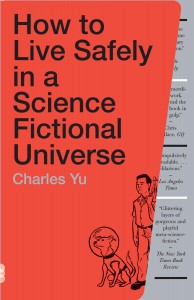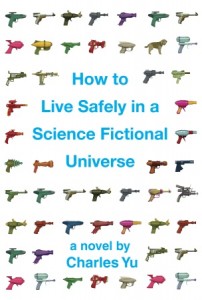September 28, 2016
American Housewife, by Helen Ellis
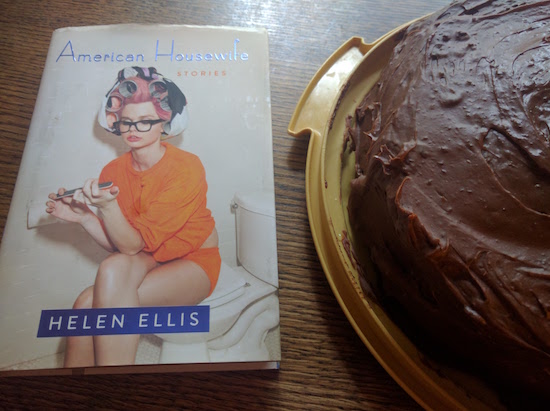
I bought Helen Ellis’s American Housewife after reading about it plenty, and then reading more in Laura Miller’s article on Housewife Fiction (which led me to Diary of a Mad Housewife, by Sue Kaufman, which I loved so much and should surely be brought back into print). I bought it at Ben McNally Books after asking at the counter for a book “with a woman in rollers on the cover, written by someone whose first name is Helen” (because I have become that bookshop patron as my mind begins to fade), and they found it for me. I read it sometime in the summer, but didn’t write about it here, not because it was insubstantial necessarily, but because it was so digestible that I didn’t really need to work through it. Reading this book was like reading a magazine, which I think was meant to be part of its appeal, with the lists scattered throughout between stories and numerous pieces with a didactic bent i.e. “How to be a Grown-Ass Lady” or “How to Be a Patron of the Arts.” There was a surface the reader could skim, is what I mean, though there is more going on if the reader dares to probe deeper.
But there is a limit to the probing (this is not a sexual metaphor, you pervert) because this book is pretty short. It is the most terrific package, a miniature hardcover, cute cover, appealing design on the spine. It is easy to objectify this book and to appreciate it, and yet my book club colleagues who work in publishing were confused about it. People don’t buy short stories, they affirmed, and yes, this is a slight book, but it’s a hardcover, more than 30 dollars. Who was meant to be a audience? Well, me, I thought, although I also know that my singlehanded efforts to support the publishing system have not been seeing the results I’ve been hoping for, so perhaps that wasn’t the most excellent plan.
Anyway, this book is intriguing. It fascinates me that it was borne of a Twitter account (@WhatIDoAllDay), and the resulting snappiness of the book’s contents. It intriguingly plays with the line between autobiography and fiction (in the way that social media in general does) and I’m interested in domesticity as divorced from motherhood, which we don’t see very often. For many women, motherhood offers a direction to one who is otherwise lacking such a thing (for better or for worse) but what do women do if they don’t pursue that option? There is a scathingness to the writing here, and my book club friends wondered just who was being satirized, and if Ellis was reviling her very readers (middle age ladies in book clubs) but I argued that she was implicating herself. This is a book about wanting to write and not writing, or else writing but not being being published (the distinction Ellis describes as the distance between Wimbledon and hammering a tennis ball against the garage door), its about the paralysis of too much choice and women’s roles and living with failure and compromise, and it’s funny, nasty and kind of amazing. We loved its Southern lady/Southern gothic vibe, and the Shirley Jackson darkness, and that John Lithgow appears as a character. I like that Helen Ellis is also a professional poker player, which seems at odds with her southern lady persona, but that is the point of southern lady personas, I think, the surprises that lie beneath an exterior of conventionality. The same could be said of the book. We all had different stories we’d connected with and others not so much, and there was so much to think about, and argue about, and even to agree upon.
And afterwards, we all ate cake.
November 12, 2013
The Fire Dwellers: Margaret Laurence and Bettys Friedan and Draper
 If Margaret Laurence’s The Fire Dwellers were published today, critics would be lauding its uncanny sense of the contemporary moment, how Laurence dares to voice the unspoken truths of motherhood, her pitch-perfect portrayal of the subtleties of maternal ambivalence. Published in 1969, Laurence’s fourth novel belongs with Atwood’s The Edible Woman and Phyllis Brett Young’s The Torontonians as essential Canadian novels born out of the world of The Feminine Mystique. Which puts the book’s contemporary moment-ness in question, but then the lessons of The Fire Dwellers don’t tend to be the kind we pass on to our daughters, however much to their detriment. Not that they’d listen anyway. Isn’t it funny how the history of feminism is so profoundly uncumulative? How we have to learn it for ourselves over and over, and it’s a revolution/revelation every time?
If Margaret Laurence’s The Fire Dwellers were published today, critics would be lauding its uncanny sense of the contemporary moment, how Laurence dares to voice the unspoken truths of motherhood, her pitch-perfect portrayal of the subtleties of maternal ambivalence. Published in 1969, Laurence’s fourth novel belongs with Atwood’s The Edible Woman and Phyllis Brett Young’s The Torontonians as essential Canadian novels born out of the world of The Feminine Mystique. Which puts the book’s contemporary moment-ness in question, but then the lessons of The Fire Dwellers don’t tend to be the kind we pass on to our daughters, however much to their detriment. Not that they’d listen anyway. Isn’t it funny how the history of feminism is so profoundly uncumulative? How we have to learn it for ourselves over and over, and it’s a revolution/revelation every time?
But then The Fire Dwellers is largely about su ch disconnectedness, between generations, between spouses, friends, between the personal and the political, and—in the case of protagonist Stacey MacAindra—from one’s self, from one’s own life. Stacey is 39, sixteen years married, mother of 4, and according to the sensationalist copy on my Seal Book paperback, she’s looking for a lover. Which isn’t really true, though it’s probably a good way to sell a paperback. Anyone who has read the book, however, will tell you that she is looking for is herself beyond her oppressive roles of wife and mother. Roles which aren’t strictly oppressive; “They nourish me and they devour me too,” she writes of her children, and it’s in this in-between where she’s stuck, imagining the various ways she is destroying her children (by being overbearing, by too much attention, with her anger, all of these suggestions underlined by “helpful” magazine articles suggesting as much) and/or all the ways they would be destroyed anyway if she somehow managed to get away from them.
ch disconnectedness, between generations, between spouses, friends, between the personal and the political, and—in the case of protagonist Stacey MacAindra—from one’s self, from one’s own life. Stacey is 39, sixteen years married, mother of 4, and according to the sensationalist copy on my Seal Book paperback, she’s looking for a lover. Which isn’t really true, though it’s probably a good way to sell a paperback. Anyone who has read the book, however, will tell you that she is looking for is herself beyond her oppressive roles of wife and mother. Roles which aren’t strictly oppressive; “They nourish me and they devour me too,” she writes of her children, and it’s in this in-between where she’s stuck, imagining the various ways she is destroying her children (by being overbearing, by too much attention, with her anger, all of these suggestions underlined by “helpful” magazine articles suggesting as much) and/or all the ways they would be destroyed anyway if she somehow managed to get away from them.
 Through the novel, Laurence plays headlines from television news programs, broadcasting war, turmoil and unrest around the world. In one sense, the headlines are juxtaposed with the domestic, but we soon come to see that these are parallel, that the home-front is no safe haven after all.
Through the novel, Laurence plays headlines from television news programs, broadcasting war, turmoil and unrest around the world. In one sense, the headlines are juxtaposed with the domestic, but we soon come to see that these are parallel, that the home-front is no safe haven after all.
“I can’t forget that piece in the paper. Young mother killed her two-month-old infant by smothering it. I wondered how that sort of thing could ever happen. But maybe it was only that the baby was crying, and she didn’t know what to do, and was maybe frantic about other things entirely, and suddenly she found she had stopped the noise. I cannot think this way. I must not.”
Children are hit by cars and killed, neighbours attempt suicide, Stacey and her husband worry about money, she fears that Mac is sleeping with his secretary, her youngest still isn’t talking (and what has she done to her to make this go wrong, Stacey wonders), and just as terrifying as the suffocating demands of motherhood is considering who she will be once the demands are rescinded, when the children are older. Who will she possibly be then?
 Laurence’s The Diviners is so central to my literary consciousness, and I couldn’t help but see Stacey in the context of the Manawaka she’d fled from as a young woman, and in relation to Morag Gunn whom she’d stood apart from as a child but whom she’d have so much to talk about if they met up again in adulthood. And I was surprised to discover that Morag didn’t even exist when Laurence wrote The Fire Dwellers—The Diviners would be published 5 years later in 1974. But in The Fire Dwellers, you see the roots of The Diviners taking shape, its ideas and experiments with narrative and form.
Laurence’s The Diviners is so central to my literary consciousness, and I couldn’t help but see Stacey in the context of the Manawaka she’d fled from as a young woman, and in relation to Morag Gunn whom she’d stood apart from as a child but whom she’d have so much to talk about if they met up again in adulthood. And I was surprised to discover that Morag didn’t even exist when Laurence wrote The Fire Dwellers—The Diviners would be published 5 years later in 1974. But in The Fire Dwellers, you see the roots of The Diviners taking shape, its ideas and experiments with narrative and form.
Stacey MacAindra is Betty Draper, is calling out for Betty Friedan, though fat load of good a book is going to do her. (I always find it interesting when people critique Betty Draper’s character for her obviousness to Friedan, as though one day every woman in America read The Feminine Mystique, and society flicked a switch). Stacey MacAindra is also so many of us, as we remarked at my book club the other night. “Maybe we all turn into Stacey MacAindra sometime…” as I tweeted last week. Women for whom the day is never long enough to encompass all the things we want to do, all the people we want to or need to be. Women for whom motherhood and selfhood become a battle, with wifehood thrown in for good measure. You’d throw it all away, if you weren’t tied to it inextricably.
Stacey’s green slacks are dated, and so is her slang, but absolutely nothing else is in this novel which 45 years later is a challenge to and a reflection of the world at once.
November 29, 2012
The Vicious Circle reads Straight Man by Richard Russo
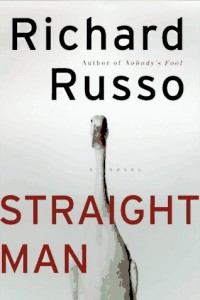 Last evening, various circumstances conspired to have me learn that it takes just 20 minutes to drive from Pharmacy and Lawrence Avenues in Scarborough to Brockton Village downtown, and to have it confirmed for the one millionth time that from the vantage point of the Gardiner Expressway between the DVP and Spadina, Toronto at night is one of the most beautiful sights in the world. And so I was a bit late for our Vicious Circle gathering but not so late, due to the swiftness of my journey, and I was pleased that they’d saved me a plate of macaroni and cheese. We’re also developing a thing for cheesies. Needless to say, it was a very balanced meal.
Last evening, various circumstances conspired to have me learn that it takes just 20 minutes to drive from Pharmacy and Lawrence Avenues in Scarborough to Brockton Village downtown, and to have it confirmed for the one millionth time that from the vantage point of the Gardiner Expressway between the DVP and Spadina, Toronto at night is one of the most beautiful sights in the world. And so I was a bit late for our Vicious Circle gathering but not so late, due to the swiftness of my journey, and I was pleased that they’d saved me a plate of macaroni and cheese. We’re also developing a thing for cheesies. Needless to say, it was a very balanced meal.
Our book was Straight Man by Richard Russo, an academic satire (we like academic satires) that which was pretty favourably received, except for one of us who found it so much like Michael Chabon’s The Wonder Boys that we didn’t see the point in finishing. Others found it funny and a comfort read, though one of us found the whole academia-line a little too close to home, not so funny after all. There was speculation as to whether academia really has this much sex, and we decided yes, although it was noted that professors don’t marry their students at quite the same rate that they used to.
Russo has written better books, it was pointed out–Empire Falls. It was decided that he’s not great at writing endings. We wondered about the relationship between this book and Lucky Jim, and wondered what kind of 50 year old man (or anyone, for that matter) would aspire to be Lucky Jim. Lucky Hank is clever though, too clever for his own good, actually, where Jim really wasn’t, which was the book’s point.
The scene of the naked journalist in the hot-tub, the image of her caking make-up like her face was falling off. The female characters in the book was as interesting as their male counter-parts. There was great writing here. We loved the complexity and grown-up nature of Hank’s marriage, and that he never cheats on his wife nor she on him. It’s too easy a plot point and this book is more for doing something different. This is a comic novel, but it’s not without considerable complexity–the lines that run through it about suicide, the scene with young Hank thinking about hanging himself from a pipe in the basement until he’s rescued by his mother, and she saves him, but the incident drives them forever apart. We liked his mother too, and her sometime paramour/chauffeur.
It’s a book much like its character–it can’t help going for the easy laugh. We thought about Lucky Jim again (though we called it Lord Jim for a moment, and then acknowledged that Conrad went for the easy laugh not often), and how much more complex was Russo’s book. There are depths here, though none of us were sure we’d visit its 400 pages again in order to plumb them.
November 4, 2012
The Vicious Circle reads The Wives of Bath
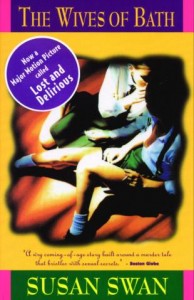 It occured to us to read The Wives of Bath after we read Skippy Dies last winter, whose female characters were scarcely invested with heartbeats let alone souls. We wanted some women with more than two dimensions, and in The Wives of Bath, we got what we were looking for. We liked this book, everyone. This is remarkable. Some of us had read it years ago, others encountering for the first time. A few of us kept talking about the movie Heavenly Creatures in connection. We talked about boarding school books, and how delicious they are, especially when the reader is young, even though the schools themselves are always terrible. Why the attraction then? It’s another world, it’s Lord of the Flies. We talked about Skim by Mariko Tamaki and Jillian Tamaki, and Jo Walton’s Among Others. And then we broke out the Cheetos.
It occured to us to read The Wives of Bath after we read Skippy Dies last winter, whose female characters were scarcely invested with heartbeats let alone souls. We wanted some women with more than two dimensions, and in The Wives of Bath, we got what we were looking for. We liked this book, everyone. This is remarkable. Some of us had read it years ago, others encountering for the first time. A few of us kept talking about the movie Heavenly Creatures in connection. We talked about boarding school books, and how delicious they are, especially when the reader is young, even though the schools themselves are always terrible. Why the attraction then? It’s another world, it’s Lord of the Flies. We talked about Skim by Mariko Tamaki and Jillian Tamaki, and Jo Walton’s Among Others. And then we broke out the Cheetos.
Mouse is the portal to the book, our connection to the story, which means we’re distanced from the story and predisposed for sympathy for her. We wondered if Mouse’s sad sad story was a weakness, if we’d been too driven to sympathize. How sad can one story get? And yet it was her personality rather than her tragedy than won her to us. She does guide the story, but then we related this to Great Expectations, to Pip, laying everything out for the reader. Certainly there is literary value in this approach.
We talked about connections between fact and fiction, about a real life murder than inspired the novel’s climax and about autobiographical elements of the story. We talked about how this was not a perfect novel, if there seemed to be more at work behind the book than the story itself. How the novel contained so many elements– gothic, intrigue, humour, violence, ideas– and that it lacked a certain seamlessness. It’s a book that’s doing so many different things at once. And then we pause: “But it’s so good!” It’s that we can sit down and talk about it so intensely, coming to new questions instead of conclusions. That such a readable book can have so much depth.
We talked more about boarding school, about ideas of gender which were less in the public discourse when the book came out. We wondered if different elements of the book would be focussed on now? We talked about bodies in the book, how they were all misshapen somehow, exaggerated, too big or too small. The sadness of the Father/Daughter relationship, and how she never gives up on her father. How we forget that Mouse is younger than she seems, and (as with most teenagers) she is probably not as hideous as she imagines herself to be. We are happy she no longer talks to Alice in the end. We think she is going to be okay. We talked about the film version of the book and how different it was, with its emphasis on the lesbian storyline, which doesn’t exist here, or does so less titillatingly because the lesbians in the book are two old women rather than two beautiful young girls.
We talked about what happened to Paulie, what made her the way she was? Was she transgender? Was it the trauma of her childhood? Or was her adoption of maleness simply a logical reaction to the way she would be treated as a woman in her society, as a refusal to cede her power. How ironic than a person with such disdain for femaleness would end up the ward of a lesbian in a girls’ boarding school. And then we thought about how interesting it was that everyone (and us) wants to know what is wrong with Paulie, and no one ever says, “And what about every single thing that’s wrong with the world around her?”
October 4, 2012
The Vicious Circle reads Incendiary by Chris Cleave
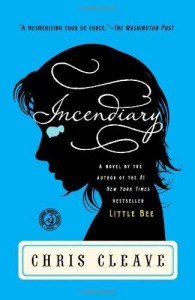 We met in the Annex on the last day of September, over scones and triangle sandwiches. Two of us had read the book previously and loved it, one of us so much that she couldn’t bear to read it again and mar the experience. We’d all enjoyed the book, except for one of us who found it ridiculous, but then noted that she’d still got through it easily. It’s that kind of book. One of us read most of it on a plane journey with a toddler. It’s a book you can read with a lot going on in the background.
We met in the Annex on the last day of September, over scones and triangle sandwiches. Two of us had read the book previously and loved it, one of us so much that she couldn’t bear to read it again and mar the experience. We’d all enjoyed the book, except for one of us who found it ridiculous, but then noted that she’d still got through it easily. It’s that kind of book. One of us read most of it on a plane journey with a toddler. It’s a book you can read with a lot going on in the background.
It wasn’t quite what we’d expected. Primed for a “heartbreaking novel about loss and grief”, we were surprised to be immediately captured by the narrator’s voice, which isn’t the kind of voice that turns up in the Ian McEweny books set in London that we usually read. We were surprised by her biting wit, her fierce intelligence, that although the character is damaged from the outset, she is not a caricature of such things. We appreciated this presentation of a working class character, and how much of the novel is about class after all (and quite up front about this). We disagreed over the upper-class characters, who seemed so unreal that some of us had supposed they weren’t actually meant to be real, in a Fight Club set up, but it seemed that they were. “I don’t know,” said a few of us who knew what she was talking about when it comes to toffs, “they seemed pretty real to me.”
We wondered why the narrator was so detached from the world around her, even before the tragedy that claimed the lives of her husband and son. Though insights into her background provided clues to a sordid world she might be grateful to be detached from. By the end of the novel, she is clearly unhinged (though how unhinged is not altogether apparent– a fair amount of ambiguity is at work here), but we wondered how sane she was when the book started. She displays symptoms of OCD from the beginning, though we note that Chris Cleave doesn’t do this stereotypically.
We love the part where she throws up on Prince William’s shoes. How she is able to look at Prince William with a broken Britain all around him, and think, with sympathy, “You are going to be the king of… this.” She has an understanding of everybody around her, which is what allows her to step into other people’s roles, into men’s hearts and fantasies. We thought that the novel had some weak plot points, but one of us supposed that we were coming to this book with different expectations when we were meant to. That this book was written in a world in which a terrorist attack on London was thought to be a dark fantasy. And, as the story goes that is always attached to Incendiary, the 7/7 attacks were launched the very day this book was published. So now readers approach this book expecting the verisimilitude promised by happenstance, but it was never meant to be a documentary. What happens to London at the end of this novel is more dystopian than anything else, and perhaps we’re not to measure it against the world we know.
In the readers’ notes at the back of the book, Cleave refutes allegations that he wrongly predicted the outcome of terror attacks on London. The chaos and horror portrayed in the novel failed to emerge in reality, but Cleave says that the parallels are not so off. They’re just more subtle: civil liberties curtailed, entrenched racism, a war abroad whose cost is bankrupting British society. To which one of us argues that Cleave is wrong, not because the others are right, but because the “changes” he outlines in his argument have always been part of England. That the terror attacks, if anything, had only brought to the surface what was there all along.
Incendiary was an absorbing, undemanding novel, more interesting than it was good. We note that all of Cleave’s books have been ambitious and well tuned into the zeitgeist, but as literature, they’re lacking. That those of us who loved the book and were encountering it again were probably wise to have abstained from a second read.
August 22, 2012
The Vicious Circle forgives us our trespasses
 Last Thursday, our book club hit what was either an all time low or an all time high, depending on your point of view. If you think it was the former, we will assure you that it wasn’t our fault, but that we’d elected to barely discuss the book at all (a rare act of defiance for the Vicious Circle, which is constitutionally obliged to discuss the book in question at least half as much as it discusses Russell Smith at every meeting) simply because the book was unremarkable. Not in the same way that Wayne Johnston’s Human Amusement was unremarkable, so bizarrely unremarkable that it blew one’s mind with its sheer uninterestingness; how could any book be so thoroughly boring (though to be fair, she of us who writes the blog post recaps felt this most among us, hence the lack of a blog post recap)?
Last Thursday, our book club hit what was either an all time low or an all time high, depending on your point of view. If you think it was the former, we will assure you that it wasn’t our fault, but that we’d elected to barely discuss the book at all (a rare act of defiance for the Vicious Circle, which is constitutionally obliged to discuss the book in question at least half as much as it discusses Russell Smith at every meeting) simply because the book was unremarkable. Not in the same way that Wayne Johnston’s Human Amusement was unremarkable, so bizarrely unremarkable that it blew one’s mind with its sheer uninterestingness; how could any book be so thoroughly boring (though to be fair, she of us who writes the blog post recaps felt this most among us, hence the lack of a blog post recap)?
No, instead the book (which was Trespass by Rose Tremain, her follow-up to the Orange Prize-winning The Road Home [which is a book, it has been reported, that gives Orange Prizes a bad name]) was mind-dumbingly uninteresting. We’ve had a conversation many times inside the Vicious Circle in which one of us makes disparaging remarks about the awfulness of genre-fiction–that it’s not the genre, but the awfulness that troubles. And another of us always points out that literary fiction also has its fair share of crappy books, books that exist solely to meet the lit-fic formula, to win orange prizes, and which actually have no souls of their own. And here was one.
Trespass was stupid, those of us who’d finished shrugged and said it was all right, but that her characters weren’t really people, that elements of the text were preposterous, that we couldn’t understand how it had received that terrific review in The Observer. And then, really, there was nothing more to say, so we moved on to ol’ Russell, debating Caitlin Moran and saying goodbye to one of our own who is decamping to Mexico in the coming days! Though we were saying goodbye via cake, which helped. And it was weird, because we’ve been a book club for almost 2.5 years and the time has flown by, and we’ve had the perfect dynamic, diversity, connection between our members. So we are very sad to see one of us (and she assures us that it wasn’t Human Amusements and Trespass that drove her to it).
We also decided that we had had enough of mediocre books and that maybe we’d all been a little too enthusiastic and uncritical when we planned our next two years of reading about a year ago. So we threw out the list and started anew. No more middling CanLit, no more books chosen because they’d been sitting on our shelves for years and a book club pick would make us pick it up finally. We decided to be more deliberate in our choices, to pick books that are either mostly likely good or that will foster good conversation.
So that we don’t have any more book-free conversations at our meetings in the future. Not that we mind so much when we do. Because even with Trespass and also without it, ours was a very splendid evenings.
July 24, 2012
The Vicious Circle reads This All Happened by Michael Winter
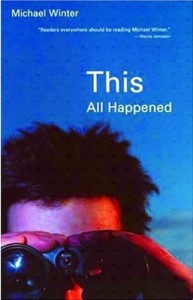 Oooh, summer nights with the Vicious Circle are the very best. Last evening, we assembled on one of our favourite West End porches as the night fell, trains rumbled by, lightning flashed, and a storm threatened to arrive. It never did. We ate ice cream sandwiches and delighted in our ever-excellent conversation.
Oooh, summer nights with the Vicious Circle are the very best. Last evening, we assembled on one of our favourite West End porches as the night fell, trains rumbled by, lightning flashed, and a storm threatened to arrive. It never did. We ate ice cream sandwiches and delighted in our ever-excellent conversation.
And speaking of ever, we were once again a book club divided, this time on Michael Winter’s 2000 novel This All Happened. Apparently Gabriel English is meant to be a heartthrob, one of us pointed out, but another disagreed, remembering the Gabriel English from Winter’s previous story collection One Last Good Look. She said, “That Gabriel English is better than this.”
Half of us liked the book, the vignettes, an entry a day for a year about ordinary life. Others found it boring, weren’t pressed to care about anything that happened. (“What all happened?”) And all of us were weirded out by punctuation, the inconsistencies less than the strange choices. No one could give an explanation for the near-omission of apostrophes. One of us pointed out that it was strange that the punctuation was so experimental when the rest of the book decidedly… wasn’t.
But no, we disagreed from the other side of the table, the other side of the bowl of Magnum ice cream bars. It was experimental in particular in relation to his other books, that it was a character from a previous book who was writing a book that Winter himself would actually go on to publish. And it is experimental to write a novel composed of mundanities. A novel in which nothing happens.
The people in this book are annoying, we complained, the main character in particular. We liked the peripheral characters best. We liked Boyd Coady. We weren’t sure what the drippy Gabriel saw in Lydia though perhaps her problem was that we only ever saw her from his point of view. Aspects of her personality seemed contradictory, but then maybe it was just his failure to see her properly.
We remarked upon absurd details going by unremarked upon admist the mundanities, like Max who pokes a hole in a condom to get his girlfriend pregnant. The rest of us realize how awful it is that we hadn’t really considered how awful that was. That Max and Daphne are held up as the great example of love in this book, which is kind of horrifying to consider.
The one moment that gripped us all was the canoe trip, when the pregnant Daphne is thrown out of the boat. This event stands out so much from the rest of the novel. We note that Gabriel English is so passive, that he has these ideals of how things should be and seems content to live on these instead of reality. That nobody has a job in this book– the arts council grants seem very generous. We loved the names, that Craig Regular was never just called by his first name. And Maisie Pye! How remarkable in CanLit that a character with the name of Pye should be good and like-able. We thought about how immature these characters were, what it meant that Gabriel English had lived a whole life until this book begins and yet this sorry love is his most significant.
“Any resemblance to people living or dead is intentional and encouraged…” Winter tells us before his story begins, and we do spend time trying to map his fictions onto reality. The edges don’t quite line-up exactly, however, which is frustrating, interesting, and fascinating. We wonder if this novel of true stories is actually more interesting in theory than execution. Though it definitely succeeds in creating a sense of place, of community. Of arts communities in small towns (and we laugh about the scene in which the erotic poetry reading upstairs from the curling club is broadcast into the curling club by mistake). It’s a novel about ways of seeing, someone remarks, notions of cameras, film, Gabriel’s window which he refers to as the eyes of the city. How the ruggedness of Newfoundland creeps into this novel about a city, in the seasons, how the women are as game to the outdoors as the men are, the fish, the fish.
We think about autobiographical novels, which there is a recent trend for. It makes us think of the reader as being in a position of the only sober person at a table full of drunks. But yes, we think. This novel was intriguing enough. It left us with questions, and that is something.
June 25, 2012
The Vicious Circle reads Frankenstein by Mary Shelley
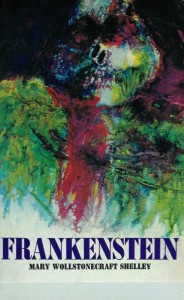 Comparing covers is one of my favourite parts of being in a book club, and I was overjoyed at our meeting last week to see that one of my comrades had brought along the crazy psychedelic edition that I read in university and had completely forgotten the look of. This time around, I’d bought a very respectable Modern Library edition (see below) whose previous owner had only yellow-highlighted a few random lines in chapter five.
Comparing covers is one of my favourite parts of being in a book club, and I was overjoyed at our meeting last week to see that one of my comrades had brought along the crazy psychedelic edition that I read in university and had completely forgotten the look of. This time around, I’d bought a very respectable Modern Library edition (see below) whose previous owner had only yellow-highlighted a few random lines in chapter five.
Anyway, I’m off track already, which is okay, because Mary Shelley’s Frankenstein is a bit heavy on the preamble anyway. (I made a chart: there are at least five stories in a story in this story, maybe six.) We didn’t have a roaring fire to gather ’round last Tuesday night, but we didn’t need one because it was so hot you’d sweat sleeping. We met up in the East End in one of the finest backyards in the city, and ate cheese, cherries, and strawberry bread, and drank just as much as we should have.
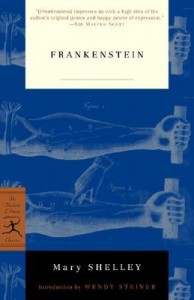 We got to talking about this book and Lionel Shriver’s We Need to Talk About Kevin, about a person dealing with the implications of having created a murderous monster, and considering whether or not the monstrousness was innate or the result of the creator’s lack of naturing. (You, my creator, abhor me; what hope can I gather from your fellow-creatures, who owe me nothing??” says Frankenstein’s monster at one point.) We spend a long time arguing about whether we were talking about Frankenstein or his monster when we said “Frankenstein”, and 50% of the time, we meant the other. Which is funny because of how they became the same creature eventually, how Mary Shelley might have planned that confusion.
We got to talking about this book and Lionel Shriver’s We Need to Talk About Kevin, about a person dealing with the implications of having created a murderous monster, and considering whether or not the monstrousness was innate or the result of the creator’s lack of naturing. (You, my creator, abhor me; what hope can I gather from your fellow-creatures, who owe me nothing??” says Frankenstein’s monster at one point.) We spend a long time arguing about whether we were talking about Frankenstein or his monster when we said “Frankenstein”, and 50% of the time, we meant the other. Which is funny because of how they became the same creature eventually, how Mary Shelley might have planned that confusion.
Is Victor Frankenstein sympathetic? And we were fortunate this night to have a Frankenstein scholar in our midst, who has written actual books on the subject, so we ended up talking about blow jobs a lot less than usual and instead discussed Victor as a man who truly doesn’t understand the consequences of his actions. We talked about the monster as self-taught (and how we loved that he took fiction as history, what it means to see the world that way), as representative of the limits of what one can do with one’s self, analogous with what a woman could do with herself in the early 19th century. And Mary Shelley herself, her biography, kept coming into this conversation. Author’s biography means more to a classic than to a contemporary work. Or does it… How we keep comparing the book to contemporary novels, because there was nothing else like it in its time, how it was a pointed response to the Romantics.
We talked about Walton the Polar Explorer, and Victor Frankenstein, of their senses of themselves as loners, as heroes, but that they’re both self-indulgent and controlling, messing with other people’s lives. It’s only their complete disregard of others which allows them to cast themselves as selfless heroes at all. How the miracle of Victor’s singular creation is something that women do all the time. Frankenstein and motherhood– apparently Shelley wrote the novel while she was pregnant. In a few weeks. Though novels are always becoming engulfed in these sorts of legends– it’s just another ring around the kernel of the story.
We talked about how Victor and the monster’s voices become more and more alike as the novel progresses, about how Victor seems set up for some of the monster’s crimes and how they’re so connected by that point that it doesn’t matter who killed who, their crazy symbiotic relationship in which neither can live without the other and Victor virtually sacrifices his bride as bait for his obsession. How the monster’s own dawning consciousness was like a baby’s, but that he’s never allowed to evolve into a human being. How you can never escape what you look like, how monsters bring out the monstrosity in others. We wondered about Mary Shelley whose own mother died in childbirth. Who was her monster?
And then the very last note I took was without context, “Hemingway was the John Irving of his time” and we’d lost the plot by then. We started yelling about 50 Shades and the state of publishing, and so it seems most appropriate just to leave it there.
May 9, 2012
The Vicious Circle reads My Life in France by Julia Child
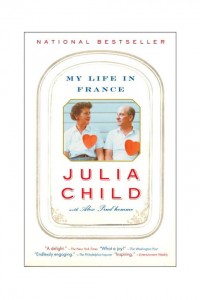 On Monday night, we assembled in Brockton Village for some French fare– quiche, excellent wine, truffles, profiteroles, and the cake from Bringing Up Bebe. Our book was Julia Child’s My Life in France, which was our first foray into autobiography, and which everybody liked, which was very unusual. And even more unusual– even though everybody liked it, we had plenty to talk about.
On Monday night, we assembled in Brockton Village for some French fare– quiche, excellent wine, truffles, profiteroles, and the cake from Bringing Up Bebe. Our book was Julia Child’s My Life in France, which was our first foray into autobiography, and which everybody liked, which was very unusual. And even more unusual– even though everybody liked it, we had plenty to talk about.
In general, we found the book delightful. There was speculation as to the nature of Julia and Paul’s romance, as to the lipstick on his belly-button. It was supposed that they’d had “a delicious sex life”, though we wondered how to rectify that with rumours that both were actually gay. And here is the thing with biography, especially auto– how fast we stop thinking about the book itself and instead become intent on the people within it.
But that’s kind of the point– we were fascinated by Child’s restraint, her control, by what is held back in her autobiography and what is revealed. How she dares to say that she hadn’t cared for her father, that she was glad when he died. Later on, she notes that she’s not a sentimental person, and we note that this is an understatement. Like Edith Piaf, who seems to be the one person Julia Child didn’t attend dinner parties with during her years in Paris (although she was Matron of Honour at Bumby Hemingway’s wedding to Puck Whitlock), Child regretted nothing, and this is a character trait that is as admirable as it is troubling and intriguing. (Also, none of us were fully convinced by it. We were sure that beneath the narrative, there was so much more going on.)
We were fascinated that the story begins when she is older, in her late ’30s, a late bloomer– what a different story this would have been had Julia Child not gone to Paris in her prime. We wonder what she was doing in the years before her story starts– yes, there was the war, but otherwise, apparently, she was up to not much. And once again, we speculate that something is being obscured. We wonder at her complete lack of emotional trauma. Though we note that she does get her digs in– she just lets her husband do the dirty work, and here we’re talking about the terrible things she lets through that he says about Simca. Her restraint is certainly not entire.
We talked about Saving Rome, a book we read last Fall, which divided us in its depiction of expatriate life. At one point, Child runs into an old friend in Paris who is as fed up with the expat thing as Megan Williams’ character had been, and Child confesses herself to be baffled by this response to Parisian life. And it’s true that Child’s take on Paris is what some of felt was missing from Williams’ book, the enthusiasm, willingness to learn and explore. But then we concede that Julia Child was a very unusual person, and the Saving Rome characters are probably more the norm.
We note that Child’s sense of adventure was never stymied, that she viewed challenge as an opportunity. That after two decades of drifting that she was so glad to find her place in the world, her path in life. That she had an unusual amount of freedom accorded by inherited wealth, but also by her extraordinary marriage. That in some many ways, her husband was her wife, and that she never fulfilled for him the role of the diplomatic wife, but this never seemed to bother either of them.
Something about the narrative grated though, however much it was delightful. That there was no depth, no variance in tone. Can one person be so perpetually buoyant? There is such distance between writer and reader and we wonder where it comes from– is it her disposition? The co-author showing his hand? We note the peculiar structure of the book itself, that it does not reach for depths. It is to be a book about “things I loved in my life.” It is to document a world that is almost gone, in terms of her own life and the food culture she came to know in France. We talked about the resources available to her in reconstructing her history– her husband’s extraordinary letters home to his brother, and also his photographs. Anyway, this is a book about vignettes. They’re meant to be sketchy. But the distance still means that we find them “sketchy” in another sense.
Anyway, she wasn’t a memoirist, but a cookbook writer. Though there was nothing lacking in her narrative here, or at least unintentionally. She knew what she doing, but why did she do it this way? We remark upon the fact that Julia Child was a very strange woman, 6″2, and that voice. This leads to more talk of her sex life again. We note that she seemed more upset at leaving her house in France than at putting her husband in a home. She writes of certain individuals who “weren’t intellectuals.” We wonder where she gets off with these judgments, and then realize that she didn’t consider her own self an intellectual either, and it is one of the instances where she is self-critical. She resents her inability to hold her own in political discussions, and it’s an ongoing project in her life to do this better.
We talk about the book’s cover– the schlocky picture on the front which makes more sense when you realize that Paul and Julia made such pictures for their Valentines cards every year. And some of us have the movie tie-in version, which is less appealing, and Meryl Streep all over the place. We talk about the movie, and how it was surprisingly charming, and we have strong opinions about Julie Powell. Though she can write, it is admitted. And then talk turns to lesser bloggers-turned-writers.
And before the talk of other things totally takes over, we remark upon how much Julia Child has to say about the publishing industry, about how much it as been falling apart in the same old ways for years and years and years. That she also had issues with and ideas about self-promotion, which is interesting because this self-promotion is meant to be a fairly modern phenomenon. Her editor Judith Jones was behind the publication of The Diary of Anne Frank in America, and we’re bothered that in Child’s book, Anne Frank’s name is misspelled without an “e”. It’s the only typo in the book that we could see, but a glaring one. And in other mistakes, we’re thinking about how the first version of her book advised baking French bread on a slab of asbestos tile, but it was righted in the end. We loved Child’s approach to life– never stop learning and don’t apologize.
February 28, 2012
The Vicious Circle reads How to Live Safely in a Science Fictional Universe
Last Sunday, the Vicious Circle met again for brunch, every one of us in attendance. We wouldn’t say we got right down to it because Charles Yu’s How to Live Safely in a Science Fictional Universe was a strange old book, not quite our thing. So we kept putting it off, because we had to talk about Mad Men, gossip, other books and ghastly things we’d read on Twitter. And then finally we started, the conversation began, and it flowed, and flowed, one of the most insightful book club discussions we’ve ever achieved. (Or maybe it just looks that way because the secretary among us took down some really extensive notes.)
We began with the central idea of the book, of the main character being stuck in a loop and how we could recognize that. That even before the part of the book where the character is both writing and reading his story at once, we had a sense of projecting ourselves and our experiences onto the story. (Which is perhaps the way that most of us read stories.) We talked about the books perceived depth versus its actual depth, and how it tricks you into thinking that there is a technical complexity to it but the complexity is emotional. This is shown when the father reveals his theory of time travel, which turns out not to be accomplishable by technology at all but by intellectual force instead, by the power of the mind. But that time travel was also a physical voyage– you don’t just appear in another place, but you have to get there. Which is sort of the way of everything.
Some of us loved TAMMY, the operating system of the main character’s time machine. But others of us were disappointed– TAMMY lacked emotional depth, one of us said. “She’s a computer program,” said another. “That’s not the point,” was the rebuttal, and that was rebutted with, “Yes, it is!” Some of us who’d read Hitchhikers Guide to the Galaxywere disappointed by elements of the book such as TAMMY, which seemed to have been done better many times before. Perhaps it’s a homage though, one of us suggested. That its connection to other works was quite deliberate. (Two of us didn’t finish the book. We just couldn’t see the point.)
We loved the twist of “science fiction” being substituted for physics here as the laws of which the universe must obey, and how the laws of science fiction opens up the possibilities for so many things. We found the mother’s story compelling, stuck in a sixty minute loop and her son feels guilty because he didn’t spring for an hour and a half. We thought this book reminded us of The Raw Shark Texts in terms of how it treats loss, creates its own universe, and considers the book as object.
We had trouble situating the book in time, kept stumbling over logic problems– how long as the main character been away from his life? It’s tricky to figure out, this universe corresponding to the laws of science fiction after all, which are hard to gets one’s head around. And then we starting thinking about movies the book reminded us of– “Moon” by Duncan Jones, “Another World”. Also the book Among Others by Jo Walton, for its employment of fantastical elements. We remark that this isn’t a book that exists in a vacuum. But does this compromise its literary quality, we wonder? There is a shallowless to it, but no. It’s actually highly literary on a mechanical level, and we note how much of the novel is about how books and novels are put together, the nature of existence in the science fiction universe is determined by tenses. And though the book seems shallow upon first reading and requires skimming to get through, we note that the book itself is a loop and that meaning becomes deeper upon subsequent readings.
And it is literary– we remark upon the good writing, the emotional resonance of the scene with his father. And that the writer exercises a great deal of restraint in order to feed the loop structure– the nature of a loop is shallowness. That TAMMY stands for the fact that so many people spend their entire lives contemplating narratives that don’t really exist. That TAMMY is his projection of self. And we end on this note: TAMMY is Google, and everything it is we’ve ever fed to it.
Then we go back to the buffet for seconds.
